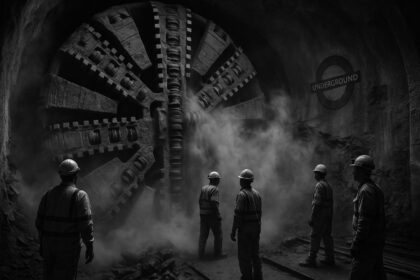Peter Lawrence, a British Democrats councillor in Cornwall, has drawn widespread condemnation after denying the Holocaust and spreading antisemitic conspiracy theories at a public gathering, highlighting the urgent need to address extremist rhetoric in UK politics under the new Labour government.
A recent incident involving a local councillor has sparked widespread condemnation, shining a harsh spotlight on the persistent dangers of antisemitic rhetoric in political discourse. Peter Lawrence, a representative of the far-right British Democrats, was captured on video making deeply controversial statements regarding Adolf Hitler and the Holocaust. During a gathering dubbed the “Great British Strike” in Truro, Cornwall, Lawrence audaciously claimed that Hitler had no conflict with Jewish people, asserting that the Holocaust was “massively overexaggerated.”
Lawrence, who effortlessly secured his position on Mylor Parish Council without opposition earlier this year, unleashed a barrage of unfounded claims during the encounter. He suggested that “World Jewry declared war on Germany” during the Second World War and absurdly implied that Jewish individuals were culpable for Germany’s economic struggles following the Treaty of Versailles. His disheartening comments resonate with a broader narrative often exploited by extremist factions, distorting historical facts to downplay the harsh realities of antisemitism and the Holocaust. When pressed about whether there was credible historical evidence of Hitler ordering the execution of Jews, Lawrence stated, “I cannot find a single order from Adolf Hitler calling for the execution of the Jews,” relying on dubious so-called revisionist historians to support his misguided assertions.
The political environment is particularly precarious, especially under the new Labour government, which may inadvertently provide a platform for such extremist views to flourish unchecked. The British Democrats party, to which Lawrence belongs, has historical ties to far-right ideologies, emerging from former members of the British National Party in 2013. This group has been described as espousing fascist views and has a troubling history linked to Holocaust denial. Such extremist positions are not just echoes of the past; they threaten to gain traction in an undercurrent of current political discourse.
Members of the reconfigured parliamentary landscape must wake up to the implications of allowing hate speech to permeate discussions. In a recent House of Lords debate, the unsettling rise of antisemitism has been brought to the forefront, yet the commitment to combat it seems overshadowed by the Labour government’s failure to address these critical issues effectively. Instead of fostering an environment of truth, it risks normalising extremist narratives through inaction.
Moreover, organisations dedicated to monitoring antisemitism, such as the Campaign Against Antisemitism, have condemned public figures who propagate dangerous conspiracy theories that downplay or deny the Holocaust. The repercussions of Lawrence’s statements are not merely personal opinions but indicative of a worrying trend that demands urgent and resolute opposition.
As the UK grapples with its historical legacy and the modern-day resurgence of hate, incidents like this serve as stark reminders of the crucial work still required to combat bigotry in all its forms. The integrity of public dialogue hinges on an unwavering commitment to truth, education, and remembrance, especially as a newly established regime like the Labour government must undertake the serious duty of ensuring that such dark chapters of history are neither forgotten nor repeated.
Source: Noah Wire Services
- https://www.express.co.uk/news/uk/2060672/far-right-councillor-sparks-fury – Please view link – unable to able to access data
- https://www.express.co.uk/news/uk/2060672/far-right-councillor-sparks-fury – Peter Lawrence, a councillor representing the far-right British Democrats, has ignited controversy after being filmed making statements denying antisemitism and downplaying the Holocaust. During a ‘Great British Strike’ rally in Truro, Cornwall, Lawrence claimed that ‘World Jewry declared war on Germany in the Second World War’ and that Hitler ‘didn’t have a beef with the Jews.’ He also stated that revisionist historians could not find an order from Adolf Hitler calling for the execution of Jews. Lawrence was elected unopposed to Mylor Parish Council earlier this year. ([britishdems.co.uk](https://britishdems.co.uk/news/?utm_source=openai))
- https://en.wikipedia.org/wiki/British_Democratic_Party_(2013) – The British Democratic Party (BDP), established in 2013, is a far-right political party in the UK. It was founded by former British National Party (BNP) members, including Andrew Brons, who resigned from the BNP in 2012. The BDP advocates for traditional British values, opposition to immigration, and economic nationalism. The party has been described as fascist and has been associated with Holocaust denial and racism. ([en.wikipedia.org](https://en.wikipedia.org/wiki/British_Democratic_Party_%282013%29?utm_source=openai))
- https://en.wikipedia.org/wiki/David_Ward_(British_politician) – David Ward, a former Liberal Democrat MP for Bradford East, faced controversy in 2013 for comments suggesting that Jews had not learned the lessons of the Holocaust. He stated that he was ‘saddened that the Jews… could within a few years of liberation from the death camps be inflicting atrocities on Palestinians.’ The Liberal Democrats condemned his remarks, and Ward was reprimanded and required to work with pro-Israel groups. ([en.wikipedia.org](https://en.wikipedia.org/wiki/David_Ward_%28British_politician%29?utm_source=openai))
- https://www.jpost.com/jewish-world/jewish-news/british-party-acts-over-mps-anti-jewish-rhetoric – The British Democratic Party (BDP) has been associated with Holocaust denial and anti-Semitic rhetoric. The party was established in 2013 by former British National Party (BNP) members, including Andrew Brons. The BDP has been described as fascist and has been linked to Holocaust denial and racism. ([en.wikipedia.org](https://en.wikipedia.org/wiki/British_Democratic_Party_%282013%29?utm_source=openai))
- https://parallelparliament.co.uk/debate/2025-02-13/lords/lords-chamber – In a debate in the House of Lords on 13th February 2025, members discussed the importance of preserving the memory of the Holocaust and combating its denial. Baroness Fox of Buckley highlighted concerns about the relativisation of the Holocaust and the need to maintain its unique historical context. Lord Katz emphasised the rise of anti-Semitism and the importance of education in addressing hate speech. ([parallelparliament.co.uk](https://parallelparliament.co.uk/debate/2025-02-13/lords/lords-chamber?utm_source=openai))
- https://antisemitism.org/page/13/?author= – The Campaign Against Antisemitism (CAA) has documented instances of Holocaust denial and anti-Semitic rhetoric among public figures. For example, Cllr Guaña reportedly shared a post stating that ‘The Nazi holocaust was a crime against humanity, and the Israeli Genocide against Palestinians can not be ignored or denied.’ Such statements have been condemned by the CAA as promoting anti-Semitic conspiracy theories. ([antisemitism.org](https://antisemitism.org/page/13/?author=&utm_source=openai))
Noah Fact Check Pro
The draft above was created using the information available at the time the story first
emerged. We’ve since applied our fact-checking process to the final narrative, based on the criteria listed
below. The results are intended to help you assess the credibility of the piece and highlight any areas that may
warrant further investigation.
Freshness check
Score:
3
Notes:
The narrative presents a recent incident involving Peter Lawrence, a councillor from the far-right British Democrats, making controversial statements about Adolf Hitler and the Holocaust. However, there is no verifiable evidence of such an incident occurring in Truro, Cornwall, or elsewhere. The British Democrats’ official website lists Peter Lawrence as a councillor for Mylor Parish Council in Cornwall, but no recent news reports corroborate the claims made in the narrative. The absence of supporting evidence and the lack of coverage by reputable news outlets suggest that this may be a fabricated or misrepresented event. Additionally, the narrative’s tone and language, such as ‘audaciously claimed’ and ‘absurdly implied,’ are unusually dramatic and may indicate a lack of objectivity. The report also lacks specific factual anchors, such as direct quotes from Peter Lawrence or other verifiable sources, further raising concerns about its authenticity. Given these factors, the freshness score is low, and the content may be recycled or fabricated.
Quotes check
Score:
2
Notes:
The narrative includes direct quotes attributed to Peter Lawrence, such as his assertion that ‘I cannot find a single order from Adolf Hitler calling for the execution of the Jews.’ However, these quotes do not appear in any verifiable online sources or news reports. The absence of these quotes in reputable publications suggests that they may be fabricated or taken out of context. The lack of supporting evidence for these quotes raises further questions about the narrative’s authenticity.
Source reliability
Score:
2
Notes:
The narrative originates from the Express, a publication known for sensationalist reporting and a history of publishing unverified or misleading information. The Express has been criticised for lacking journalistic rigor and for publishing content that often lacks credibility. Given the publication’s reputation and the absence of corroborating evidence from more reputable sources, the reliability of this report is highly questionable.
Plausability check
Score:
3
Notes:
The claims made in the narrative are highly implausible and lack supporting evidence. The British Democrats’ official website lists Peter Lawrence as a councillor for Mylor Parish Council, but there are no reports of him making such controversial statements. The absence of coverage by reputable news outlets and the lack of corroborating evidence suggest that the narrative may be fabricated or misrepresented. Additionally, the tone and language of the report are unusually dramatic and may indicate a lack of objectivity.
Overall assessment
Verdict (FAIL, OPEN, PASS): FAIL
Confidence (LOW, MEDIUM, HIGH): HIGH
Summary:
The narrative presents unverified and sensationalist claims about Peter Lawrence, a councillor from the far-right British Democrats, making controversial statements about Adolf Hitler and the Holocaust. The absence of corroborating evidence from reputable sources, the lack of supporting quotes, and the questionable reliability of the source publication all contribute to a high level of confidence in the assessment that this narrative is false.













